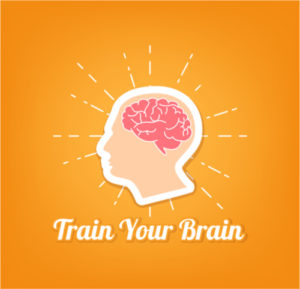Think about how stressed you are before an exam.
Now, think about how stressed you might before an exam like the EPPP (read E-triple-p).
Since I’m sure you’re already a little worked up over a past test that was particularly stressful, or one that is coming up that is putting some extra pressure on you, I want to remind you that you’re ok. You’re going to be fine! That’s right—I’m going to go ahead and make that bold presumption. I know it’s stressful and hard to believe that you’re going to survive but take a little faith that you will.
The future clinician in me wants me to remind you that if at any time you feel that your anxiety about testing, something else, or just generally feels as though it is impairing your life—please see a mental health professional. Although it could be typical anxiety, it could be something that breaks the threshold into clinical disfunction.
To give a little face to the beast, it is important to examine test-taking anxiety and the impact that it can have on our overall test scores, especially the EPPP. Test Anxiety (TA) is extremely common among students, one study noting that 20% of respondents endorsed some form of test-taking anxiety, whether non-clinical or clinical [1]. With such a high number, you might think that there would be a wealth of information on how to handle it. Unfortunately, it’s quite the contrary.
Signs and Symptoms of Test Anxiety
Anxiety can manifest in a few different ways, and it is important to note that it will present differently for each person. Physically, anxiety, including Test Anxiety, can present as a rapid heart rate, profuse sweating [3], psychomotor agitation (think: bouncing your leg or fiddling with a pencil), or other “nervous habits” such as biting nails [4].
Anxiety tends to present in a rather unfortunate way behaviorally. For example, avoidance behaviors are very common in anxiety issues. These behaviors could include procrastination or avoiding test preparation [3]. Think about it this way: have you ever been so nervous about an exam or an assignment that you just avoided doing it altogether rather than face the stress? Even though we intellectually know that putting off the stressful event won’t truly alleviate the stress, it is so much easier to postpone than to address the issue at hand [2]. We will talk more about how to avoid and address these issues in the “ways to cope” section of this blog.
In addition, anxiety can also present behaviorally similarly to aggression [6]. Again, think about your own life. Have you ever been so stressed out or nervous that you just “snap” at someone? Even if you know that whatever set you off wasn’t that big of a deal—it just seemed like it at the time [6]. Research suggests that the thing that sets you off when you’re under a lot of stress is just the straw that broke the camel’s back, and the poor barista that made the mistake got the brunt of your built-up stress and anxiety [6].
Depression is also another major presentation of anxiety [6]. Rather being able to maintain a constant state of stress, the reaction is to retreat within themselves into a state of depression [6]. It is our natural response—there’s some major danger presented to us (in this case, an exam), and the length of time that our “fight-or-flight” response has been activated simply cannot remain activated any longer. In an over-compensation by our body to preserve itself is to move in the complete opposite direction of the heightened state of arousal experienced during periods of high stress [6].
Overview of the EPPP
If you’ve never heard of the EPPP, you’re lucky. The EPPP is the licensure exam faced by most psychology graduate students. Along with the EPPP, you will also need to take another similar exam before licensure based on in which state you will be practicing. Therefore, you will need to be able to generalize these strategies and this infomration to more than just one major standardized exam standing between you and your license.
To better face the monster, let’s get a deeper understanding of the EPPP itself. This exam is geared for doctoral level psychology students is governed by the Association of State and Provincial Psychology Boards (ASPPB) [8]. At the time that this blog is being written the EPPP is a one-part exam that is to be taken over 4 ½ hours [7]. However, this will likely be a two-part exam by the year 2020 [8]. This exam includes 225 questions [7], of which only 175 are scored [9]. When the director of the ASPPB was asked about the test, she described it as “essentially everything you learned in graduate school” [10]. Just a little bit intimidating, right?
If you would like to read more on the EPPP, check out our blog post on the EPPP and licensure requirements for professional psychology.
Test Anxiety on Overall Outcomes
I know it already seems stressful enough, but let’s dive into the actual, research-based negative outcomes associated with test-anxiety. One 1990 article written by Zollar and Ben-chain note that in our age our lives seem to be determined by our overall test performance [11]. I.e., if we do poorly on an exam, it reflects directly on us and on our overall self-definition [11]. Not only do they impact our own self-definition, they can impact the way that others’ view us. In such a competitive society, we need some easy way to compartmentalize and rank people [12]. Fortunately or unfortunately, standardized exams seem to be the best solution at this time. Knowing that our exam performance could impact the way that employers or other graduate programs view us, there is an added level of stress.
One study found a significant relationship between a student’s level of test anxiety on major exams and their overall performance [12]. By using Spielberger’s Test Anxiety Inventory, Rana and Mahmood were able to demonstrate that students that experienced high levels of a cognitive factor of test anxiety (worry) did significantly worse on these exams [12]. They were able to use these findings to conclude that many students’ overall low performance or underachieving on certain exams could be attributed to unchecked high levels of Test Anxiety [12].
Of course, there is a good level of stress, sometimes referred to as eustress [13]. However, the stress that this blog is talking about is much more detrimental. Eustress refers to that positive level of stress that motivates you to get things done and to get them done well. For example, you might be a little worried about doing well in a particular class, so you ensure that you do all of the assignments and study a little extra for the exams. The stress that has been shown to be associated with negative outcomes is taking that level of stress to the extreme, distress [13], and in this case, Test Anxiety [1].
Ways to Cope with Test Anxiety
Thankfully, treatment for TA has been shown to be quite effective [3]. Rather than just be doomed to wander the halls of your higher-education institution, there are some treatments offered by professionals and some interventions that you can do by yourself. First, of course, if you feel like you are suffering from TA, please seek professional help. Many college campuses offer free or low-cost mental health care. Feel free to speak with the professional about what you might be going through. They offer a judgement-free space to air your issues, and they may even have resources for your classes that could help you cope better with the test anxiety.
Additionally, there are simple training techniques that you can take to improve your own Test Anxiety symptoms. For example, time management is a major step that you can take to better your anxiety. This isn’t to say that you don’t already have good time management skills, but sometimes our anxiety takes that away from us. When syllabus week rolls around, look at all the major exams that you will need to prepare for. Set yourself a schedule—actually budget specific time that you will be in the library or other study space plugging away at the material. If it might help you, have a gentle accountability buddy. This is someone who will gently remind you that you have some studying to do, or who could gently guilt you into making sure that your work gets done.
Developing some more pronounced study skills can also help. For example, rereading your notes the same day that they are written or even the next day can greatly improve your retention. Also, simply highlighting the information in your book can be helpful as well. By starting your studying early, it can actually help reduce the anxiety around studying! There is a myriad of different study skills that can help you improve your grade, so I don’t want you to limit your scope of study development just to this list. Please do your own research and see what works for you!
We can see that anxiety surrounding your studies can be detrimental to your overall performance. With some professional interventions or accommodations and some personal anxiety relief tactics, anxiety and TA is something that can be managed!
- American Test Anxieties Association. (2018). Retrieved from https://amtaa.org/
- Connon, H. A., Rash, J. A., Allen Gerwing, A. M., Bramble, B., Landine, J., & Gerwing, T. G. (2016). Post-Secondary Educators’ Perceptions of Students’ Test Anxiety. Canadian Journal for the Scholarship of Teaching and Learning, 7(1), 9.
- Test Anxiety & Academic Performance (2018). Retrieved from https://www.mheducation.ca/blog/test-anxiety-academic-performance/
- Kerr, W. J., Dalton, J. W., & Gliebe, P. A. (1937). Some physical phenomena associated with anxiety states and their relationship to hyperventilation. Annals of Internal Medicine.
- Sarason, I. G. (1984). Stress, anxiety, and cognitive interference: Reactions to tests. Journal of personality and social psychology, 46(4), 929.
- Barrett, P. M., Rapee, R. M., Dadds, M. M., & Ryan, S. M. (1996). Family enhancement of cognitive style in anxious and aggressive children. Journal of abnormal child psychology, 24(2), 187-203.
- Zhou, E. (2018). Are You Dreading the EPPP? Here’s How to Prepare for it. Retrieved from http://blog.time2track.com/are-you-dreading-the-eppp-heres-how-to-prepare-for-it
- The Association of State and Provincial Psychology Boards. (2018). Retrieved from http://www.ASPPB.net/
- Reasons why you need to stop studying 3 days before your test. (2018). Retrieved from https://blog.taylorstudymethod.com/category/eppp-study-video/
- Cynkar, A. (2007). The Path to EPPP Excellence. Retrieved from https://www.apa.org/gradpsych/2007/09/eppp.aspx
- Zoller, U., & Ben-Chain, D. (1990). Gender differences in examination type, test anxiety, and academic achievement in college science: a case study. Science education, 74(6), 597-608.
- Rana, R., & Mahmood, N. (2010). The relationship between test anxiety and academic achievement.
- Le Fevre, M., Matheny, J., & Kolt, G. S. (2003). Eustress, distress, and interpretation in occupational stress. Journal of managerial psychology, 18(7), 726-744.


